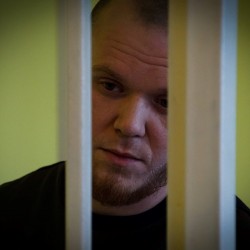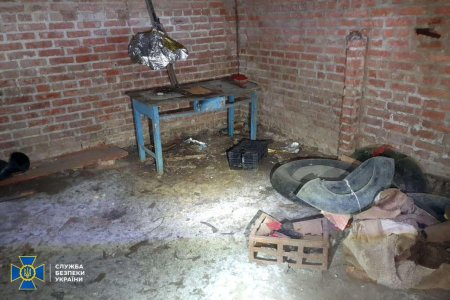
It is disturbingly likely that Russia has fabricated new charges against Ukrainian political prisoner Hennadiy Lymeshko after illegally imprisoning him for eight years.
Lymeshko should have been freed in February 2025, having served his politically motivated sentence to the end. He was, however, initially moved to a deportation centre for foreign nationals, where the conditions are only marginally better than in Russian prison colonies. This was already of major concern since Russia’s war of aggression against Ukraine has blocked ordinary mechanisms for returning Ukrainian citizens to Ukrainian territory.
Iryna Lymeshko has now received information from strangers, asserting that her husband has been taken from the deportation centre to a SIZO, or remand prison in Piatygorsk or Stavropol, and is being held there in solitary confinement. She has no contact with him, and, typically, at present there is no official confirmation of this.
According to the Crimean Human Rights Group, there are unconfirmed reports that criminal charges have been initiated over supposed ‘calls to extremist activities’, with Lymeshko facing a further 3-year sentence.
It is unclear at present whether these charges are linked to the FSB harassment and reprisals that Lymeshko suffered in 2023, however it was feared then that this might be the precursor to new, fabricated, charges. As reported, Lymeshko was transferred at the end of August 2023 to [even more] ‘harsh conditions of imprisonment’ [SUS] for the duration of his sentence. He was claimed to have ‘incited Russian citizens to fight on Ukraine’s side’, although no information appears to have been provided as to how he was purported to have done this, and what evidence had been presented.
The harsher regime was doubtless a ploy as such conditions extend to contact with his family, meaning that Lymeshko was even more isolated from his wife, young daughter and mother than before. He had then managed only to get the information about the transfer before the harsher restrictions came into effect.
Lymeshko managed to get the information to his wife, Iryna, before all contact was lost, with the extra harsh conditions extending to contact with family members. At the time Iryna explained that her husband had had several visitations from the FSB [security service] since Russia began its full-scale invasion of Ukraine, with the FSB questioning him about supposed links with Ukraine’s SBU [Security Service]. She called the claim that Hennadiy had tried to ‘recruit’ Russians absurd, saying that he was always extremely careful what he said about the war. Like other political prisoners, he would have been fully aware of the methods that the FSB uses, including the use of other prisoners.
Hennadiy Lymeshko is one of many Ukrainians seized by the FSB in occupied Crimea and charged with ‘sabotage’ on the basis solely of a videoed ‘confession’. Such ‘testimony’ is almost invariably extracted through torture while a person is held incommunicado and without access to independent lawyers. Iryna first learned of her husband’s ‘arrest’ when she saw him on Russian television.
Hennadiy, who was 25 when seized by the Russians, had, unfortunately, not heeded Iryna’s fears and had accepted work in occupied Crimea. The fears were well-founded, not least because Lymeshko had very recently taken part in the defence of Donbas, initially as part of a volunteer battalion linked with Right Sector, and then as a contract soldier. It was while he was serving in Donbas in 2016 that he met his wife, a medical student from Lviv who was working as a paramedic during the university holidays. He had left the army after the couple’s daughter was born, She was just seven months old when he was seized..
This was one of several cases where the ‘confessions’ tortured out of Ukrainian political prisoners for Russian propaganda proved very different from the eventual indictment. The latter accused Lymeshko only of possession of a weapon and the illegal production of explosive device, although the original ‘confession’ spoke of ‘a sabotage plot’ and of working for the SBU.
Lymeshko had not had an independent lawyer and is very likely to have been tricked into agreeing to plead guilty on 10 May 2018, perhaps in exchange for a shorter sentence. While ‘judge’ Yevgeny Rykov from the occupation ‘Sudak city court’ was aware that Lymeshko had a very small daughter, he chose to consider that extenuating factor outweighed by the supposedly aggravating factor of Lymeshko’s alleged political motive of “hostility to the Russian Federation in connection with reunification (sic) of Crimea”. Lymeshko was sentenced to eight years’ maximum-security [‘harsh-regime’] imprisonment. That sentence was upheld on 24 June 2018 by the Russian-controlled ‘Crimean high court’.


